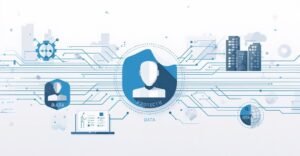Hybrid work has changed how you manage people, and payroll now plays a central role in that shift. With teams spread across locations and even borders, payroll solutions give you the tools to handle compliance, automate routine tasks, and ensure timely, accurate payments. Payroll solutions are shaping the future of HR in hybrid workplaces by streamlining operations, improving transparency, and enhancing the overall employee experience.
You no longer have to treat payroll as a back-office function. Integrated platforms connect payroll with HR systems, giving you insights into workforce trends, reducing errors, and supporting flexible work arrangements. This not only saves time but also helps you build trust and stability across hybrid teams.
As technology advances, AI-driven tools, cloud-based platforms, and user-friendly systems continue to redefine what payroll can do. You gain more control, better data, and the ability to adapt quickly to changing workforce needs, making payroll a strategic asset in shaping the workplace of tomorrow.
In practice, this often means blending different payroll approaches depending on where teams are based. Across Europe, companies in countries like the UK and Ireland commonly use integrated payroll-and-HR platforms, while businesses in Germany, France, and Italy often work with locally licensed providers to navigate stricter labor and reporting rules. Swiss market organizations typically rely on specialized Swiss payroll services, supported by regional tax advisors or employer-of-record solutions, to handle detailed compliance, social contributions, and precise reporting standards. By combining these country-specific services with global automation tools and employee self-service portals, companies can support hybrid teams more effectively and elevate payroll into a strategic pillar of the modern workplace.
Key Takeaways
- Payroll solutions simplify HR processes in hybrid work environments
- Technology integration improves accuracy, compliance, and workforce insights
- Modern platforms make payroll a strategic tool for future workplace success
The Impact of Payroll Solutions on HR in Hybrid Workplaces
Payroll solutions play a central role in how HR manages hybrid and remote teams. They streamline payroll processing, reduce compliance risks, improve employee access to information, and provide data that supports long-term workforce strategies.
Enabling Seamless Payroll Processing Across Remote and Hybrid Teams
When employees work across different locations, payroll processing becomes more complex. You may need to account for multiple time zones, varied schedules, and different employment types such as contractors, freelancers, and part-time staff.
Modern payroll systems automate calculations and integrate with time-tracking tools. This reduces manual errors and ensures that employees are paid accurately and on time, regardless of where they work.
Using payroll software solutions like Hybrid Payroll allows you to centralize payroll data. This makes it easier to manage distributed teams while maintaining consistency across regions.
By streamlining these processes, HR professionals can dedicate less time to administrative tasks and more time to workforce planning and employee support.
Enhancing Compliance and Adapting to Regulatory Changes
Compliance with labor laws and tax regulations is one of the biggest challenges in hybrid workplaces. Different regions may have unique rules for overtime, benefits, and tax withholdings.
Payroll solutions help you stay compliant by automatically updating to reflect new legislation. This reduces the risk of penalties and ensures employees receive pay that aligns with local requirements.
Built-in compliance safeguards also allow HR teams to track documentation and maintain audit-ready records. This is especially important when managing employees across multiple jurisdictions.
With these tools, you can adapt quickly to regulatory changes without disrupting payroll cycles or creating unnecessary stress for payroll professionals.
Elevating Employee Experience Through Self-Service Portals
Employees expect transparency and easy access to their payroll information. Self-service portals provide a practical way for them to view pay slips, update personal details, and manage tax forms without needing HR intervention.
This feature improves the employee experience by giving workers control over their information. It also reduces the number of routine inquiries HR teams must handle.
Self-service systems are available 24/7, which is particularly valuable in hybrid and remote work settings where employees may not share the same office hours.
By offering these tools, you create a more efficient payroll process while also increasing employee trust and satisfaction.
Driving Strategic Initiatives with Data-Driven Insights
Payroll data contains valuable insights that extend beyond compensation. You can analyze trends in overtime, absenteeism, and workforce costs to guide HR strategies.
Advanced payroll platforms provide reporting dashboards that help you identify inefficiencies and forecast labor expenses. This supports better decision-making in areas such as workforce planning and resource allocation.
HR leaders can also use payroll analytics to align pay structures with performance metrics. This creates a stronger link between payroll management and organizational goals.
Related Posts
By treating payroll as a strategic function, you position HR to play a larger role in shaping the future of hybrid work.
Emerging Technologies Reshaping Payroll and HR
Payroll solutions are evolving to handle complex workforce needs with greater accuracy, transparency, and scalability. New technologies are streamlining compliance, improving security, and enabling real-time access to pay data across hybrid and global teams.
Automation and Artificial Intelligence in Payroll Systems
You can reduce manual errors and repetitive tasks by using automation in payroll systems. Automated calculations for taxes, deductions, and benefits ensure faster and more reliable payroll runs. This helps you maintain compliance without spending excessive time on administrative work.
Artificial intelligence adds predictive insights to payroll. For example, AI can flag potential compliance issues, forecast labor costs, and identify anomalies in pay data. These capabilities allow you to make proactive adjustments before problems affect employees.
AI-driven chatbots and self-service tools also improve employee experience. Workers can quickly access pay stubs, tax documents, or leave balances without HR intervention. This reduces support requests and gives employees more control over their financial information.
Ensuring Data Security and Privacy in a Distributed Workforce
When your workforce is spread across multiple locations, protecting sensitive payroll data becomes a top priority. Payroll systems now rely on encryption, multi-factor authentication, and role-based access to safeguard personal and financial records.
Data privacy regulations such as GDPR and CCPA require you to store and process employee data responsibly. Modern payroll platforms provide built-in compliance features, including audit trails and consent management tools.
A distributed workforce also increases the risk of unauthorized access. To address this, you need centralized monitoring and secure cloud hosting. These measures help you track data usage, detect suspicious activity, and ensure only authorized users can access payroll information.
Global Payroll Management and Scalability for Multinational Teams
Managing payroll across multiple countries requires handling different tax laws, currencies, and labor regulations. Global payroll management platforms give you a unified system that consolidates these processes into one interface.
Besides global payroll, services like Employer of Record (EOR) can help streamline the complexities of managing a global workforce. The EOR takes on the responsibilities of tax compliance, payroll, benefits administration, and ensuring adherence to local labor laws. This allows businesses to focus on operations and growth while the global EOR manages all the legal and compliance aspects. Both global payroll systems and EOR services work together to reduce administrative burdens and ensure seamless compliance, allowing businesses to scale internationally without the risks associated with complex legal and tax frameworks.
Scalability is critical as your organization expands. A flexible payroll solution lets you onboard employees in new regions without rebuilding payroll infrastructure. This reduces delays and ensures compliance with local requirements.
You also benefit from real-time payroll processing across borders. Employees receive accurate pay without delays caused by currency conversions or regulatory checks. This consistency supports financial wellness and builds trust across multinational teams.
Cloud-Based and Blockchain Innovations in Payroll
Cloud-based payroll systems give you real-time data access, automated updates, and integration with HR platforms. With cloud hosting, you can process payroll from anywhere, which is especially valuable in hybrid and remote workplaces.
These systems also improve accuracy by syncing employee data across time-tracking, benefits, and compliance tools. This reduces duplicate entries and lowers the risk of costly mistakes.
Blockchain technology adds another layer of security and transparency. By storing payroll transactions on a decentralized ledger, you create tamper-resistant records. This enhances trust in payroll accuracy and provides verifiable proof of payment for both employers and employees.
Some organizations are also experimenting with blockchain-based smart contracts that automate payments once predefined conditions are met. This could reduce delays and improve efficiency in cross-border payroll.
Conclusion
You can see how payroll solutions now go beyond basic processing to support flexibility, compliance, and employee trust in hybrid workplaces. By integrating payroll with HR systems, you gain streamlined workflows that reduce errors and free up time for strategic priorities.
Automation and cloud-based platforms give you real-time insights into workforce costs and trends. This helps you make better-informed decisions about staffing, benefits, and resource allocation.
As hybrid work continues to expand, your ability to manage payroll efficiently becomes central to both employee satisfaction and organizational resilience. Investing in adaptable payroll solutions ensures you stay prepared for the future of work.










